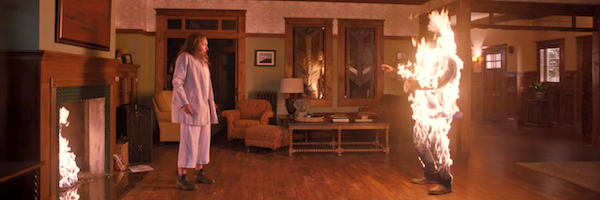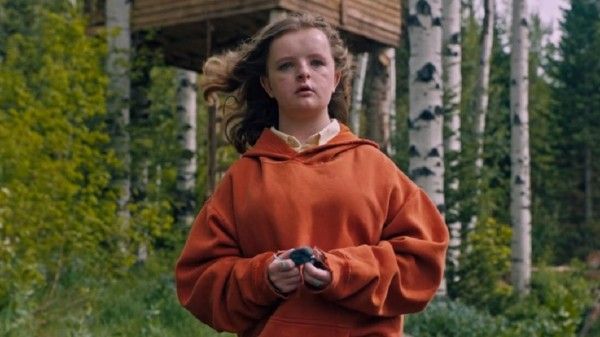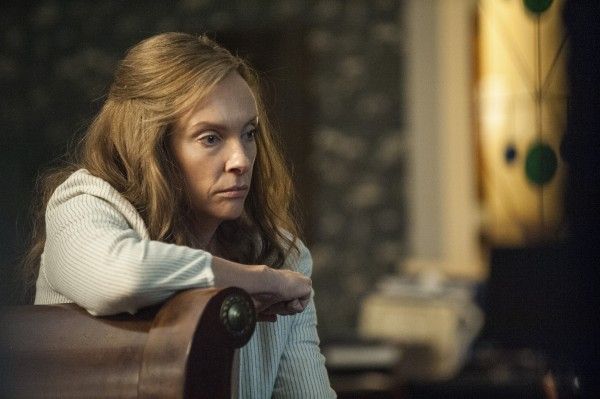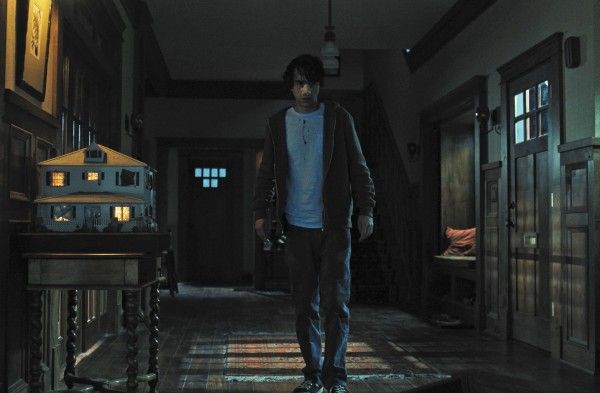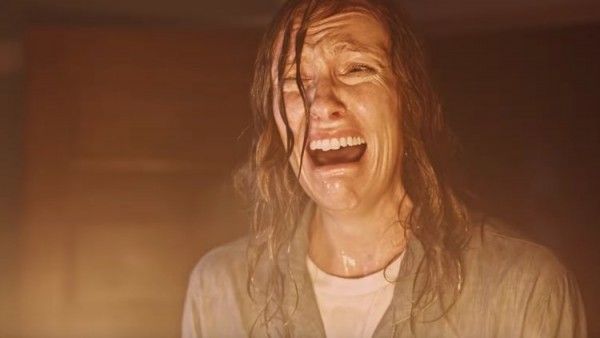In case you missed the headline, this is a spoiler review for Hereditary, so if you haven't seen it, scram! Seriously, get out of here, what are you doing, it's so good.
Hereditary will fuck you up. Possibly for a very long time. First-time feature filmmaker Ari Aster delivers a directorial debut that will go down in the books as one of the most outright menacing cinematic experiences in the history of horror. It's hard to quantify something like fear -- it's too personal, too subjective -- but you don't have to look far to see that this one is affecting the majority people on a profound level and sending them out the door with a pit of evil in their stomach. Where most horror movies are content to prod at your soft spots, Hereditary reaches into your guts and rearranges them, leaving you with a sick, tight feeling and not quite enough room to breathe.
They say that when it rains, it pours, and Hereditary is about when that rain becomes a full-on assault that washes away the foundations of an entire family. Annie (Toni Collette) and her family are doing their best to grieve for her mother; a distant, disturbed woman whose death brings tension into their home but not much else in the way of emotion. Teenage son Peter (Alex Wolff) is ambivalent, devoted husband and father Steve (Gabriel Byrne) seems dutiful more than anything else, and even Annie has to sneak out to group therapy to try to conjure the grief she knows she should be feeling. The only one who seems to care is Charlie (Milly Shapiro), the family's youngest child and frankly, a creepy little shit.
Played to perfection by the Tony-winning Shapiro, Charlie stares dead-eyed into the void, drawing disturbing images or crafting even more disturbing sculptures. She clucks her tongue at inopportune moments, including her grandmother's funeral -- a sound that will come to haunt your nightmares -- and when a bird smashes into her school window, she snips the head off withs scissors, placing it on a sculpture. She sees visions of her dead grandmother, surrounded in flames. So yeah, she's creepy. But that doesn't make it any less shocking or disturbing when sticks her head out of a moving car window and gets decapitated by a telephone pole.
Credit to the A24 marketing team, unless you went through the trailer and reviews with a fine-toothed comb, there's no way you saw that coming and the piercing screams that flood the theater in the aftermath prove it. "Oh god, no!" "Jesus!" Cries reverberate throughout both audiences I saw the film with, underscored by the most impressive chorus of gasps I've ever heard from a live crowd. Personally, I pretty much had to scrape my jaw off of the floor after that moment and the sickening, horrifying sequences of grief that follow.
Charlie's death skyrockets the film's stakes into the stratosphere. If you were ever foolish enough to think Hereditary came with a safety net, Aster gleefully cuts the ropes right out from under you. Anything can happen and all your nightmare are real, welcome to Hereditary. It also skyrockets the stakes for the characters, who suddenly find themselves drowning in grief, guilt, and accusation. Wolff has to carry a tremendous load in the film, playing PTSD without becoming a cliche and the film hinges on his slow, steady descent into despair. The performances are outstanding across the board, but it's Collette who will break your heart into a thousand pieces and then wield the shards against you with deadly precision.
There's a plane of performance that even the best actors only seem to reach a few times in their career, if they're lucky. Collette spends the film soaring on that plane. She's surprising, touching, funny, and sometimes literally breathtaking. Her dinnertime verbal sparring match with Wolff is the highlight of the film; a vicious moment of emotional violence that sucks the air out of your lungs. When Collette screams, "I am your mother!", you're suddenly five years old again, sitting in corner in time out. You messed up and you know it and you just feel bad. Collette's performance transports you, again and again. Her starling, expressive face is the buggy you ride on this emotional roller coaster through hell, and if she doesn't deserve Oscar attention come awards season... well, no one will be surprised because the Oscars are notoriously biased against genre, but it will be an injustice.
If the performances are uniformly fantastic, so too are the technical elements of Aster's filmmaking, which elevate Hereditary into the realm of classics. Aster, his composer Colin Stetson, and his sound department use sound like a weapon, instilling unease and panic in the audience through the soundscapes of the film alone. I'd wager money that you could just listen to Hereditary and it would still be terrifying. Hereditary also employs a number of clever sound gags to jangle and disarm the audience. Think of those god damn clucks, Charlie’s tick, which ultimately become a jolting sound of terror throughout the film. Then there’s the pulsing sub-drone sound in Annie’s peak moments of frenzy; the muddled boom-boom-boom of a heart that’s racing too fast and a mind that can’t be still.
Stetson’s ambient score blurs the lines between conventional composition and sound design, steering clear of sweeping melodies and hand-holding musical cues in favor of a work that moves like an evil organism, slouching with inevitability toward the film’s terrifying final reveal. It's a downright sinister piece of music. Don’t listen to it in the dark, or you’ll wind up with a chilling certainty that something terrible is watching you from the foot of your bed, the dark recesses of your closet, and oh shit could Annie be crawling on my ceiling?
When it comes to the sound design, two sequences really take the cake and demonstrate just how effective a single sound can be in the midst of well-staged silence. You know the ones. The first is, of course, that scene. Charlie’s shocking death, followed by stillness as Peter slowly drives home, trudges to his room, and lays there staring into the void. With the camera steady on his unblinking face, we hear Annie’s footsteps as she heads to her car, we hear the front door open, then close, and we know what’s coming — Aster pains us an aural picture — and even though we all know what we’re waiting for, we’re not ready. When Annie discovers her daughter's body, she unleashes an inhuman wail that cleaves you open down to the bone. It’s a sickening, incendiary moment; as devastating as Charlie’s death is initially shocking.
The second moment is the film’s other big decapitation — Annie’s. When Peter sees his mother floating in the air, sawing off her own head, he hurls himself out the window (an understandable impulse) and lands face first in the dirt below. Echoing the trauma of Charlie’s death, the camera holds steady on Peter’s face as we listen to the scratching, whirring sound of the garrote slicing through flesh and bone, and again, the moment we’re all waiting for — the head thunks to the floor. Sick. Disturbing. Completely effective. Hereditary has no shortage of exceptional sound gags (and an equally impressive confidence in silence), but these twin moments of trauma are the crowned jewels.
If the sound design is a masterpiece of horror through immersion, equal attention must be paid to the camerawork, which is a pointed and expertly constructed exercise in toying with expectations. Working with fellow AFI grad Pawel Pogorzelski, Aster shoots his film like a dark drama, leaning into richly lit close-ups and setting a stunning frame for the performances. But the is also unyielding promise that some some horrifying reveal or sinister presence is just around the corner. The sinister presence is there, but those expected reveals never come, and each new shot strings the tension along a little further. You're waiting for the hammer to drop. The film also boasts possibly the most effective nightmare scene in movies, a moment of panic that screeches like a tea kettle threatening to boil over, covering my entire body in cold sweat and a rash of goosebumps.
Bye and large, Aster isn’t interested in jump scares, which means you never get moments of relief. Instead, that tension spirals up, up and away. He's not going to let you off the hook. When Hereditary does reveal That Horrible Thing (whatever it may be at the moment), it doesn't give you screeching violins or showy smash cuts, it invites you to discover the horror on your own. Wide shots reveal hidden nightmares in the darkest corners of the frame – were you one of the first to spot Annie on the ceiling, or did you hear people screaming before you noticed the reveal? Either way, the frame invites you to inspect it -- take a look, you know you want to -- and your inspection yields nothing but regret and terror.
The result is that the camera always moves with intention. There are some flashy moments – the opening zoom into Annie's miniature house, which crawls to life inside Peter's bedroom. And, of course, that inverted shot as Annie strides toward Joan's apartment. But for the most part, the camera is steady and meticulous; the close-up frames of a character study and the methodical movements of a master. Aster and Pogorzelski invite you to get close with the characters, to buy into their drama like it's Steel Magnolias, but once you've got your heart on the line, Hereditary doesn't just rip it out, it lights it on fire and sacrifices it to the devil. Or, no -- Paimon.
If there's a failing to Hereditary, it arrives in the film's final moments, when the disappointment of concrete answers is laid at the audience's feet. It's a satanic cult, summoning a demon. Of course. What else would it be? It's not that I don't think Aster should have provided answers, it's that they can never be as satisfying as the existential terror of not knowing. And ultimately, Aster tries to have his cake and eat it too here, offering a definitive answer, but one that leaves a few too many questions niggling at the back of your brain. The film's ending just doesn't pack the punch Hereditary deserves.
But frankly, it's a small crack in an otherwise flawless construction. Like one of Annie's most perverse miniatures, Hereditary is complex, detailed, and expertly crafted.Watching Hereditary is like being wrung out, over and over, until there's nothing left of you but the puddle of sweat you leave on the floor. Textured and soulful, the film uses grief and the disintegration of a dysfunctional family as the launching pad for terror, never losing sight of the heartbreaking drama underneath the blood-curdling nightmare.
Rating: A

